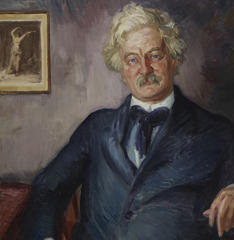Ralph Waldo Emerson Quotes - Page 111
Ralph Waldo Emerson (2014). “The Portable Emerson”, p.159, Penguin
Ralph Waldo Emerson (2015). “Poems”, p.159, The Floating Press
Ralph Waldo Emerson (1851). “Essays, lectures and orations”, p.46
Yet a man may love a paradox, without losing either his wit or his honesty.
Ralph Waldo Emerson (1960). “Journals and Miscellaneous Notebooks: 1841-1843”, p.37, Harvard University Press
Ralph Waldo Emerson, Edward Waldo Emerson, Waldo Emerson Forbes (1911). “Journals of Ralph Waldo Emerson, 1820-1872 [1876] Ed”
Ralph Waldo Emerson (2010). “The Later Lectures of Ralph Waldo Emerson, 1843-1871”, p.120, University of Georgia Press
Ralph Waldo Emerson, “The Titmouse”
Ralph Waldo Emerson (1981). “The Portable Emerson: New Edition”, p.209, Penguin
Ralph Waldo Emerson, Albert J. Von Frank (2015). “Ralph Waldo Emerson: The Major Poetry”, p.40, Harvard University Press
Ralph Waldo Emerson (1911). “The Complete Works of Ralph Waldo Emerson: Lectures and biographical sketches”
The perception of the comic is a tie of sympathy with other men.
Ralph Waldo Emerson (2010). “Collected Works of Ralph Waldo Emerson, Volume VIII: Letters and Social Aims”, p.85, Harvard University Press
Speech is better than silence; silence is better than speech.
Ralph Waldo Emerson (1851). “Essays, lectures and orations”, p.274
Ralph Waldo Emerson (2013). “Delphi Complete Works of Ralph Waldo Emerson (Illustrated)”, p.1493, Delphi Classics
None shall rule but the humble,And none but Toil shall have.
Ralph Waldo Emerson, Albert J. Von Frank (2015). “Ralph Waldo Emerson: The Major Poetry”, p.172, Harvard University Press
Ralph Waldo Emerson (2010). “The Later Lectures of Ralph Waldo Emerson, 1843-1871”, p.210, University of Georgia Press
Ralph Waldo Emerson, David Mikics (2012). “The Annotated Emerson”, p.128, Harvard University Press
Nor sequent centuries could hitOrbit and sum of Shakespeare's wit.
Ralph Waldo Emerson (2007). “Poems”, p.228, Cosimo, Inc.
The nobler the truth or sentiment, the less imports the question of authorship.
Ralph Waldo Emerson (1875). “Letters and Social Aims”, p.155
There are two laws discreteNot reconciled,Law for man, and law for thing.
Ralph Waldo Emerson (2013). “Delphi Complete Works of Ralph Waldo Emerson (Illustrated)”, p.108, Delphi Classics
A person seldom falls sick but the bystanders are animated with a faint hope that he will die.
1860 The Conduct of Life,'Considerations by the Way'.







